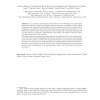Free Online Productivity Tools
i2Speak
i2Symbol
i2OCR
iTex2Img
iWeb2Print
iWeb2Shot
i2Type
iPdf2Split
iPdf2Merge
i2Bopomofo
i2Arabic
i2Style
i2Image
i2PDF
iLatex2Rtf
Sci2ools
192
click to vote
GLOBAL
2003
Springer
2003
Springer
The Klaim Project: Theory and Practice
Klaim (Kernel Language for Agents Interaction and Mobility) is an experimental language specifically designed to program distributed systems consisting of several mobile components that interact through multiple distributed tuple spaces. Klaim primitives allow programmers to distribute and retrieve data and processes to and from the nodes of a net. Moreover, localities are first-class citizens that can be dynamically created and communicated over the network. Components, both stationary and mobile, can explicitly refer and control the spatial structures of the network. This paper reports the experiences in the design and development of Klaim. Its main purpose is to outline the theoretical foundations of the main features of Klaim and its programming model. We also present a modal logic that permits reasoning about behavioural properties of systems and various type systems that help in controlling agents movements and actions. Extensions of the language in the direction of object orie...
Artificial Intelligence | GLOBAL 2003 | Kernel Language | Multiple Distributed Tuple | Primitives Allow Programmers |
Related Content
| Added | 06 Jul 2010 |
| Updated | 06 Jul 2010 |
| Type | Conference |
| Year | 2003 |
| Where | GLOBAL |
| Authors | Lorenzo Bettini, Viviana Bono, Rocco De Nicola, Gian Luigi Ferrari, Daniele Gorla, Michele Loreti, Eugenio Moggi, Rosario Pugliese, Emilio Tuosto, Betti Venneri |
Comments (0)

